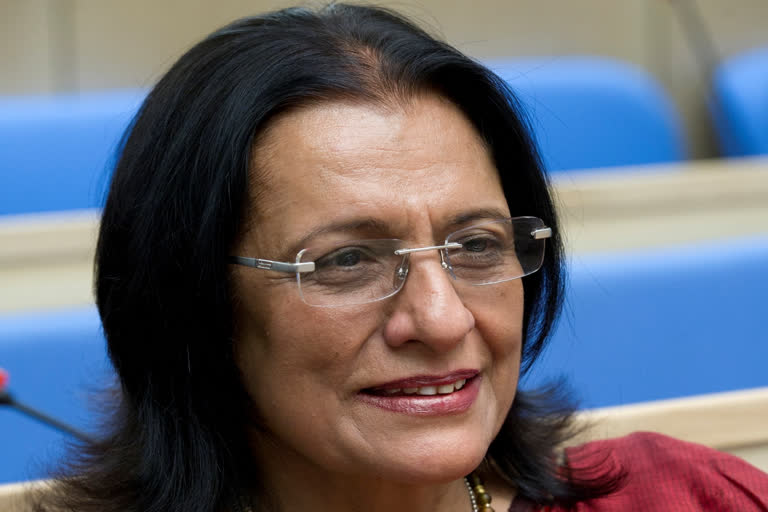New Delhi: The World Health Organisation (WHO) on Thursday hailed India’s efforts to fight and contain the Covid-19 pandemic.
In an exclusive interview with ETV Bharat's Gautam Debroy, Dr Poonam Khetrapal Singh, Regional Director, WHO South-East Asia said that considering the time taken for licensure and mass production after the trials have been completed, the earliest that vaccine doses could be available is early- to mid-2021. She said that India’s response to COVID-19 outbreak has been strategic, tailored to the evolving pandemic and should be seen in the context of the country’s unique challenges.
Here are excerpts from the interview:
Q - How does WHO find India's Covid-19 containment strategy?
India's response to the COVID-19 outbreak has been strategic, tailored to the evolving pandemic and should be seen in the context of the country’s unique challenges – demographic, geographic among many others. Since early this year we have witnessed unprecedented efforts – whether it was scaling up testing capacities, setting up of COVID-19 hospitals and isolation centres, training of health workforce, local production of essential medical supplies such as PPEs and masks, etc to ensure a steady supply. Identifying hotspots, marking containment areas and focusing efforts to further scale up response, India has made tremendous efforts and these efforts need to continue.
As active cases plateau, now is the time to be even more alert. As we embrace the new normal and get back to our lives we have to constantly remind ourselves that we continue to live amidst a pandemic. Globally, numbers are still on the rise and humanity continues to be at risk from COVID-19. We need to continue to further strengthen implementation of core public health measures - test, detect, isolate and treat. Individuals should practice physical distancing, hand, and respiratory hygiene, and wear a mask when needed. We cannot let our guards down
Read:SC seeks Centre's reply on plea alleging no approval for Remdesivir, Favipiravir to treat COVID-19
Q - What is your take on the prospective Covid-19 vaccines in India including two indigenous ones?
Globally, there are 44 candidate vaccines that are currently undergoing clinical trials. These include two indigenous candidates from India that are being developed by Bharat Biotech and Zydus Cadila. The Bharat Biotech vaccine has received permission to initiate Phase III trial, while Zydus Cadila is conducting Phase II trial. Some other vaccine developers have tied up with some Indian manufacturers to conduct Phase II trials in India. These include the University of Oxford/AstraZeneca vaccine and the Gamaleya Research Institute vaccine. In addition, there are 154 candidate vaccines that are in pre-clinical evaluation phase. Indian manufacturers are collaborating with international developers on some of these vaccines.
Q - When can we expect Covid-19 vaccine?
Currently, around 200 candidate vaccines are at some stage of development. Of these, 44 candidate vaccines are in human trials. Ten of these are in phase III trials. There are several others currently in Phase I/II, which will enter Phase III in the coming two months. WHO is working with companies and sponsors, as well as with Gavi, CEPI and others through the ACT Accelerator to expedite vaccine testing, as well as the scale-up of manufacturing so that countries will have access to sufficient doses if and when a vaccine is available.
At this stage, we cannot say with certainty when a vaccine will be available. It will depend on the time it takes to complete the Phase III trials and on the outcomes of the evaluation on efficacy and safety of individual vaccines. And this will take a few months for any of the vaccines, including those that are the front-runners. Considering the time taken for licensure and mass production after the trials have been completed, the earliest that vaccine doses could be available is early- to mid- 2021.
Read:COVID Vaccine: Infections Reported Among Sputnik V Trial Volunteers
